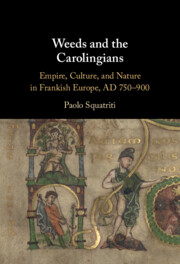
- Publisher:
- Cambridge University Press
- Online publication date:
- June 2022
- Print publication year:
- 2022
- Online ISBN:
- 9781009072328

Why did weeds matter in the Carolingian empire? What was their special significance for writers in eighth- and ninth-century Europe and how was this connected with the growth of real weeds? In early medieval Europe, unwanted plants that persistently appeared among crops created extra work, reduced productivity, and challenged theologians who believed God had made all vegetation good. For the first time, in this book weeds emerge as protagonists in early medieval European history, driving human farming strategies and coloring people's imagination. Early medieval Europeans' effort to create agroecosystems that satisfied their needs and cosmologies that confirmed Christian accounts of vegetable creation both had to come to terms with unruly plants. Using diverse kinds of texts, fresh archaeobotanical data, and even mosaics, this interdisciplinary study reveals how early medieval Europeans interacted with their environments.
‘This delightful book teems with plants that refuse to be mastered. Farmers wrangled with them in the fields. Ideologues grappled with them in their politics. And readers will be captivated by them, not least for Squatriti's revelation that weeds were double-agents - both antagonists and protagonists in early medieval culture.’
Jamie Kreiner - University of Georgia
‘Paolo Squatriti explores a new corridor between the territories of Carolingian history and environmental history, examining good and bad weeds as sensitive proxies of material usages, perceptions, and representations in Charlemagne's age. In a subsistence agriculture, weeds played a critical role according to time rather than available space. Based on a wide range of readings, Squatriti's book brilliantly illustrates how the tools of history, archaeology, palaeobotany, agronomy and linguistics can converge in a cultural history of how medieval people inhabit the world.’
Jean-Pierre Devroey - Free University of Brussels
‘This is a brilliantly conceived book, which reveals the deep and tangled relationships between political thought and the natural world. The ways in which people think about ‘good’ plants and ‘invasive’ or ‘bad’ ones relates directly to their ideas about order, governance, and productivity; while these issues are of fundamental importance to society now, Squatriti shows just how much thinking around them changed in the Carolingian world. In between late Latin and vernacular, and between local practice and normative ideals, Squatriti reveals how words for weeds, explanations for their existence, tools for their removal (both physical and metaphorical) were tied to emerging forms of knowledge and authority. Squatriti’s scholarly eye is omnivorous, and he draws comparisons, and seeks explanations in unpredicted yet outstandingly insightful places. This book draws with equal expertise upon archaeobotany, intellectual history, and religious reform literature to trace the ways in which ideas about everyday life, food, crops, and land management shifted in a new political world.’
Caroline Goodson - University of Cambridge
‘The study outlines a new research topic in a wonderfully eloquent way … I wish this important pioneering study a wide readership.’
Barbara Schlieben Source: H-Soz-Kult
‘The great expert on early medieval Italy once again demonstrates his confident mastery of sources and scientific literature.’
Dietrich Lohrmann Source: Francia recensio
‘Drawing on a wide range of readings, this book brilliantly illustrates how the tools of history, archaeology, paleobotany, agronomy, and linguistics can converge into a cultural history of the ways in which medieval people inhabited the world.’
Jean-Pierre Devroey Source: Le Moyen Âge
 Loading metrics...
Loading metrics...
* Views captured on Cambridge Core between #date#. This data will be updated every 24 hours.
Usage data cannot currently be displayed.